| Article Overview:
What is the status of the Global Intelligence Corps? Is it
divided by the politicians of nations raging over who's in charge of the war in
Iraq? Or, does the intelligence community of the world stand
above, aloft of the bandy roosters of politics? Are they
our true Sentinels of Vigilance? Find out. |
 VigilanceVoice VigilanceVoice

www.VigilanceVoice.com
Saturday--March
8, 2003—Ground Zero Plus 542
___________________________________________________________
As World Leaders Shake Fists & Fingers, Howl & Scream Over War, The
Intelligence Community Stands Vigilant
___________________________________________________________
by
Cliff McKenzie
Editor, New York City Combat Correspondent News
|
GROUND ZERO, New York City, Mar. 8--I
took a deep sigh of relief the other night when Maurice Sonnenberg,
former Vice Chairman of the National Commission on Terrorism,
responded positively to my question: "When the war erupts in Iraq,
will the nations currently at odds with the U.S. over Iraq bind
together in support of battling Terrorism, or will they be further
divided?"
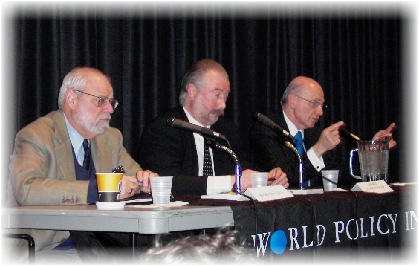 |
|
Professor Richard Allen, Group Moderator, and Maurice Sonnenberg |
Sonnenberg was one of three scheduled panelists at The New School's
World Policy Institute speaking on "America's Intelligence Breakdown"
Thursday, Nov. 6. Also scheduled was Ian Cuthbertson, Director of
the Counter-Intelligence Project. Mr. Cuthbertson was unable to
attend due to a last minute crisis.
Richard Allen, professor of law at Brooklyn Law School and
American Scholar in Residence at the EastWest Institute, was also in
attendance.
My wife and I sat up front, as we usually do at the World
Policy seminars. I prefer to be close to take photos and to study
the panelists as they speak. Someone once told me to read a man's
eyes for the truth of what he says, not his lips. I have used my
eyes for ears ever since.
During the questions and answer period, the audience was bent
on jamming political agendas down the speakers’ throats. They were
looking for blood, specifically George Bush's, by hammering questions
about America's bellicose tactics in standing up to Terrorism despite
global criticism. I sensed the audience wanted the panelists to
confirm that Bush was arrogant, abrasive, and a finger-pointing
warmonger, a theme prevalent among colleges where dissident opinions
flare from sophomoric mouths..
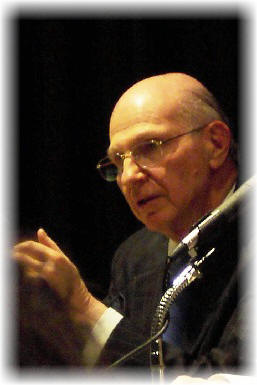 |
|
"Terrorism
isn't going to go away", Sonnenberg stated |
Both
speakers, however, were above the attempts to stir the rancor pot.
In blunt, historical terms, both speakers denied the thinly
disguised anti-war and anti-American policy questions and elevated
their answers to the strategic rather than tactical plane of dealing
with Terrorism at Large.
"I see fifty years of turmoil ahead," Sonnenberg stated.
"Terrorism isn't going to go away. We need to prepare ourselves for
it. This means we must reexamine how we deal with a problem that
challenges our current interpretation of Constitutional rights. We
have to weigh our civil liberties against the preservation of our
national security."
He was responding to questions machine-gunned at him by a
number of students concerned that the Patriot Act was a government
attempt to whittle away individual rights under the excuse of war.
The questions ranged from wiretaps to torturing Terrorist suspects.
They couldn’t have been more down Sonnenberg’s alley.
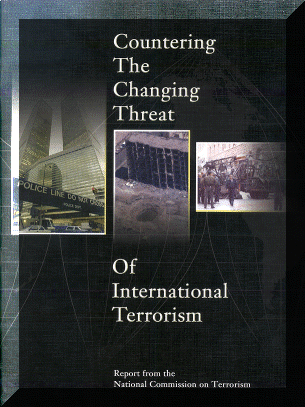
|
|
Maurice
Sonnenberg served as former Vice Chairman of the National
Commission on Terrorism |
Sonnenberg was a vital force in framing counter-terrorism
strategies prior to the Nine Eleven attack. His warnings and
suggestions for radical changes in America's intelligence
infrastructure plus a need to restructure certain privacy laws to
allow intelligence less risk-adverse access, had been generally
glossed over until post Nine Eleven. The report, published in July
2000 to the 105th Congress, received scathing criticisms by
the press because the frankness of the report included adjusting civil
liberties as we know them to meet demanding intelligence efforts to
thwart Terrorism.
One headline stated after the report was issued:
“National
Commission on Terrorism Report: 'Not A Document To Be Cast Aside
Lightly; It Should Be Flung With Full Force Across The Room'
Prior to the seminar I, read the report and saw the clarity of
its warnings. Had America installed the suggestions prior to Nine
Eleven outlined in the document, perhaps the tragedy of Nine Eleven
might have been averted.
Intelligence today, he cited, still faces many roadblocks.
One startling fact is that FBI and CIA agents pay 50 percent of their
personal liability insurance out of their own pocket. They are also
personally liable to defend themselves in part should they act in such
a manner as to bring litigation down on their heads.
This policy, he said, "tends to make agents risk adverse."
The threat of such liability often makes agents "flinch" when it comes
to pushing forward on issues that could be construed a violation of
certain rights.
Another major concern then and now is the issue of
"separation of agencies," and antiquated data input and retrieval
systems that make both the timely collection and analysis of
information almost impossible. The panelists were less than
optimistic about the reshuffling of government into the Homeland
Security Department at a cost of $38 billion, especially since the two
major intelligence sources, the FBI and CIA remain stand-alone
entities. Models for bringing intelligence to the Cabinet Level were
exampled by England’s MI5, its domestic intelligence unity, and MI6,
its foreign or CIA counterpart.
The issue of intelligence over civil liberties was a major
concern for the audience.
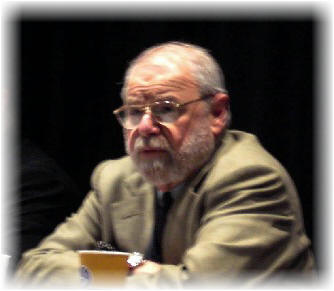
|
|
"I would
resort to torturing the kidnappers of my grandchildren to get them
back if I had to" Allen remarked |
Professor Allen was blunt regarding his stance on the issue.
In his opening statement, addressing the question of suspending
certain civil liberties to Terrorist suspects, including a question
regarding torturing Terrorists to elicit information, the professor
provided a hard-line metaphor.
"If my grandchildren were kidnapped
by Terrorists who demanded a million dollars, and because I do not
have a million dollars, if it came down to me letting them kill or
hurt my grandchildren or to torture the Terrorists to find out where
my grandchildren were and how to retrieve them safely....well, there
is no question what I'd do."
Both panelists bit the reality
bullet to the audience's chagrin.. I don't believe the speakers'
frankness was appreciated, for it dealt with the Big Picture of
stopping Terrorism in the future, weakening arguments bent on
weakening American leadership today.
Sonnenberg didn't mince words
regarding the current harangues America is receiving by factions in
the U.N. opposed to U.S. unilateral policy against Terrorism.
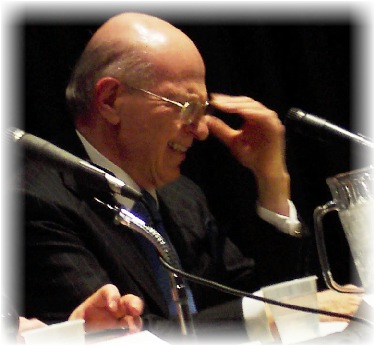 |
|
Sonnenberg
grimaced listening to questions thrown at him and Professor Allen |
"We can't pay that much attention to
what is happening in the political arenas," he said.
"Bureaucrats are arguing philosophically at the moment for various political reasons. But the fact is that everyone knows Terrorism
is here to stay. Behind the noise nations are making pro
and con the issue of going to war with Saddam Hussein, stands a strong
global intelligence community. It doesn't play games.
Each element is working together despite national political
differences to stop the proliferation of weapons of mass destruction
falling into the wrong hands."
He reminded the audience
that until recently warring nations in the Middle East meet weekly at
intelligence briefings to share information.
"The intelligence community is
the global backbone in this war. It won't let politics
weaken it. Policemen are policemen the world over."
I felt a yoke lift.
Finally, a vision larger than who's more right and who's more wrong
was emerging.
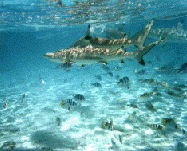 |
|
...circling
America waiting to feed |
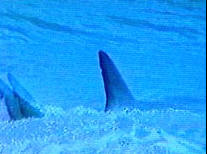
|
|
Complacent,
hungry nations are... |
It was the
first time I felt the sinew of the world's muscle flexing as one unit
against Terrorism. If I took the headlines as gospel, it
would appear the United States was standing alone with Britain on a
gangplank, and below, thrashing in the waters, swarmed packs of hungry
sharks with German, French, Russian and Chinese saw-toothed fangs..
"The global intelligence
community is unified on the issue of Terrorism," he asserted.
"And, each day that unity grows stronger. Terrorism must be
stopped before it gets started."
His strongest point came at the
end of the seminar when he said, "Once the war against Saddam Hussein
begins, it will send a signal to other nations thinking about using
Terrorism as a weapon of power, telling them to back down or suffer
similar consequences. There will be a rippling effect that
will be good for the world."
On a scale of one to ten,
he gave our present state of intelligence gathering and analysis
against Terrorism a five. While that sounded bad, he reinforced
it was moving up the scale, not down.
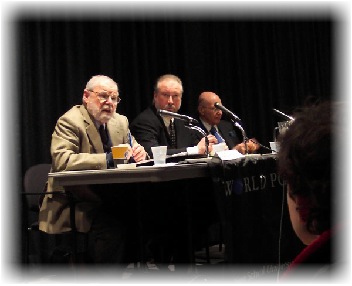 |
|
Professor
Allen (on the left), a strong advocate of civil liberties cited
examples of how other nations have fewer than the United States
especially during these challenging times. |
On the issue of civil
liberties versus national security, Professor Allen cited how other
nations have cinched their civil liberty belts to quash Terrorism.
In England, he noted, a policeman could now arrest a Terror suspect
and get a warrant for the arrest forty-eight hours later; in France,
until recently, a suspect could be held up to a year before trial or
sentencing, he said.
Allen also quoted Supreme Court
Justice Hugo Black who said "the Constitution is not a suicide pact."
Then he pounded his hammer on reality's anvil.
"We are in a situation that is
Armageddon in nature. If weapons of mass destruction become
readily available to Terror factions, we all are in danger.
I am pessimistic about the future. But don't forget. We
(America) conduct war more civilly than any nation on earth."
I thought heartily
about his last statement.
While no other
nation bends over backwards to offer its citizens equal rights and
maximum liberties, equally, no other nation has as much pressure on it
to engage in war with civility than the United States.
Recently, the
Administration issued a policy allowing journalists to report on the
war from front-line positions, in contrast to a restraint placed on
them in the Gulf War. Nothing seems more dangerous than to
allow public opinion to dictate a military operation, but fighting
Terrorism is not a war against a people, it is a war against a concept
of brutal destruction by those who would use Fear, Intimidation and
Complacency to rule the world.
Sonnenberg called
the War on Terrorism an "asexual war." He noted that
fighting Terrorism is not about taking the high ground and planting a
flag of victory over any nation, but about a constant state of
vigilance to suppress its proliferation among those radical fractional
elements who seek power through threat. You can't draw a circle
around Terrorism, he noted.
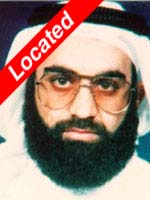 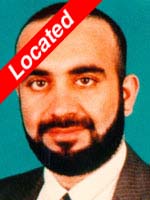 |
|
Khalid Shaikh
Mohammed "Most Wanted Terrorist" was recently captured by the
Pakistani Government and is an example of working together |
In
reinforcing the knitting of nations as one universal intelligence body
working apolitically to sniff out and snuff Terrorism, the recent
capture of Khalid Shaikh Mohammed by the Pakistani government serves
as an example of global apolitical intelligence to permeate national
borders without the flames of politics searing its fantail.
Sonnenberg reinforced the
world intelligence community has one goal--to find, capture or kill
Terrorists. All nations, he maintains, realize they can be the
victims of Terrorism as easily as not. A biochemical agent
or dirty nuclear bomb in the hands of a group of radical combatants
who are bent on exercising their power over others, can lead to
devastating results for all nations.
A smallpox epidemic, for
example, unleashed in one nation, can spread to countless others as
easily as an airplane can take off from one airport and land in
another in a matter of hours, containing aboard unsuspecting carriers
of the disease.
It was good for me to
hear news that is often buried deep in the bowels of political
conflagrations. There is a unity among the world, an army
of Sentinels of Vigilance, who do have their ears to the rail.
They are the intelligence gatherers, the Parents of Intelligence
Vigilance.
Despite the communication
barriers that hobble organizations like the CIA and FBI from enjoying
a free flow of information, both are bound to protect the people from
harm--foreign or domestic.
But what Mr.
Sonnenberg and Professor Allen made vividly clear, was that another
element has been added to the stew of nations in this respect.
There is not only a foreign need for intelligence, and a domestic need
for it, but also a global need that runs on the same track.
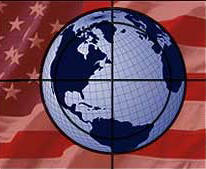 |
|
The panelists
agreed there is not only a domestic and foreign need for
intelligence but also a global need |
The movement of a
Terrorist suspect in Yemen is as important to the police chief in
Two-Boots, Montana as it is to Scotland Yard or M-5. Where
that individual is going is anyone's guess. He or she
could be on a Terror mission to almost any nation, or any state or
province or prefecture. He could be heading for
anywhere in the world's neighborhood, and not necessarily to blow up
some vital engine of industry, but simply to poison a water supply, or
to unleash the madness of some virulent agent to prove the porous
nature of society and its vulnerability to harm by anyone with a
penchant for bullying others.
I heard the message
loudly. We should not judge the world's stance on
Terrorism by the battles currently underway in the United Nations
Security Council. Despite all the mud slinging, a unified
group of nations is grinding away minute by minute in an intelligence
war against Terrorism.
It also makes sense.
The United States is
constantly offering the U.N. intelligence information in support of
its evidence that Saddam Hussein is violating his disarmament
agreement. And daily, the U.N. is questioning that
intelligence, demanding more "proof." Mr. Sonnenberg
stated the other night: "You can't handle a crisis until a
crisis occurs."
Sadly, this is what the U.N.
seems to want. They want to wait until Saddam Hussein
unleashes some of his hidden arsenals against others. They
want to react not proact to Terrorism. The U.S. wants to
proact. Therein lies the rub.
Intelligence's purpose is to
wave red flags so fires don't burst into raging holocausts.
It's mission is to warn the Sentinels of Vigilance to act now rather
than later, to snuff out the smoke before it becomes fire.
Since Terrorism deals in deadly
weapons that are indiscriminate in nature, with the capacity to kill
thousands by misuse or madness, it cannot be treated with the same
sanity one might use against nations and leadership of the past.
In this way, the U.N. is
anachronistic in its approach, for it struggles to preserve the idea
of the "sovereign state, where negotiations and diplomacy once served
to quell uprising. But Terrorism ignores the nation-state
structure of such diplomacy, for it has no morals. It would just
as soon sell its weapons of mass destruction and arm the indigents as
use them to threaten others into Complacency.
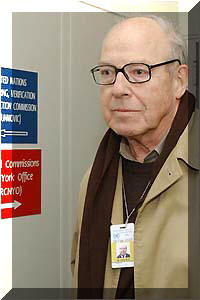
|
|
Hans Blix,
Chief Weapons Inspector for the United Nations |
Just yesterday Hans
Blix, the chief U.N. weapons inspector, noted in his speech to the
Security Council that Saddam Hussein's reported mobile biochemical
units were not yet confirmed, but cited various vehicles had been seen
scuttling about the country. While attempting to refute
American intelligence--which is the sum of all intelligence gatherers
around the world--he also slipped and brought up the red flag:
What if Saddam had such mobile biochemical stores?
I think it is virtually criminal that the
U.N. is favoring diplomacy over intelligence. Each day it
demands "proof" of the red flags, it is really saying: "Let's
wait until he does something really bad before we act."
But Terrorism can't be treated with kid
gloves.
It seeks to kill or maim the innocent with
unexpected attacks on unsuspecting targets.
Intelligence knows this. Intelligence is the bloodhound
that brays the warning of danger. Politicians want to wait
until the Twin Towers crumble before they act. They are
risk-adverse also. Thus, they are Complacent by nature.
Sadly, I feel Mr. Sonnenberg's analysis of
"5" on a scale of one to ten regarding his optimism toward our current
state of security is probably accurate.
But happily, I believe America is racking
up a ten in its willingness to act on warning signals rather than wait
until the next bomb explodes, or the vials of biochemical's work their
way out of Iraq into the hands of those whom Saddam Hussein feels are
just as power hungry as he.
 |
|
Rub the Lamp
of Vigilance and protect the Children |
In a way, the decision to chose sides on
the issue is as easy as considering this choice. If your
children were under a potential threat, who would you run to for
protection--the local politician or the local policeman?
Obviously, the local politician is inclined
to limit your concerns, for he probably ran on a platform of "keeping
the peace." To imply or infer your child isn't safe might cost
him a vote.
On the other side of the coin, the
policeman knows the Beast of Terror is everywhere, and wouldn't
hesitate to draw his gun and rush to your home to insure your child's
safety. He would take the warning you issued as
justification for taking action--forceful action if necessary.
So when it comes to betting on the
United Nations to affirm whether Saddam Hussein is a Terrorist threat
demanding immediate police action, or relying on global intelligence
to dictate that decision leaves little to be discussed.
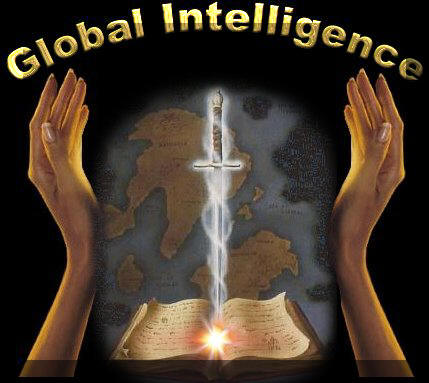 |
|
The Vigilant
Sentinels of Intelligence will come to the aid of the Children's
Children's Children |
Hopefully,
what Mr. Sonnenberg said about other Terrorists backing
away after Iraq is invaded and Saddam unseated, will come
true. Hopefully, they will retreat to their
caves and realize that Sentinels of Intelligence have
won over Complacency of politics and diplomacy.
And we, the Citizens
of Vigilance, will be able to breathe just a little easier.
That is, as long as we keep our Terror Hunters at work,
listening, sifting, analyzing and communicating the heartbeats
and footsteps of the Beast of Terror.

Mar. 7--Thomas
Jefferson Fought Terrorists Unilaterally 199 Years Ago
©2001
- 2004, VigilanceVoice.com, All rights reserved -
a ((HYYPE))
design

|
|
|